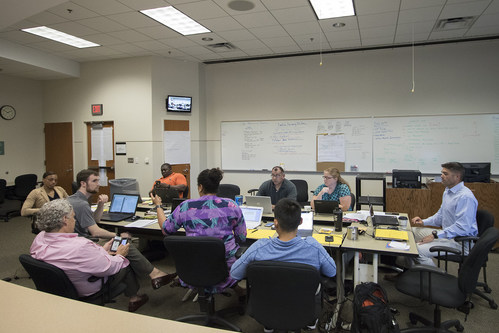Homeland Security Simulation Prepares Military, Veteran, Civilian Students for Real-World Emergencies
OVERLAND PARK, Kan., June 20, 2018 /PRNewswire/ -- Local emergency management teams have a new tool at their disposal. Military, veteran and civilian students in the University of Kansas' new homeland security master's program created and implemented an emergency plan for a long-term blackout during a simulation-style practicum June 18-19 at the KU Edwards Campus in Overland Park.
The intensive, two-day exercise was the result of extensive research and modeled after the 2003 blackout of the Eastern Grid and the hurricanes in Texas, Florida and Puerto Rico in 2017.
Nine students acted as the Douglas County emergency management team, dealing with a malware intrusion. Douglas County's team worked closely with the students leading up to the exercise and, along with other area experts, will receive the final plan as a resource for future emergencies.
"This exercise provides an incredible opportunity for our first responders, the National Guard, emergency management officials, and media to test our coordination, policies and procedures now so we are better prepared for threats to our power grid," said Teri Smith, director of Douglas County Emergency Management. "Our emergency management community must be prepared to deal with the challenges posed by a short- or long-term mass power outage, and by training together, we continue building relationships that leave us better positioned to respond to a real-world event. Not only does this permit an opportunity to test our abilities, but it has an impact on students and maximizes active learning while supporting their community."
Students took on roles similar to their diverse backgrounds – logistics, communications, the Army National Guard, law, engineering, first response and medicine – as they navigated civil unrest, the media, legal and political implications, and unforeseen circumstances.
Mike Hoeflich, John H. & John M. Kane Distinguished Professor of Law and director of KU's Master of Science in Homeland Security: Law & Policy, designed the exercise after working with Kansas City companies, rural professionals and Washington, D.C., experts to learn what would happen in this scenario.
"There's a lot at stake here," Hoeflich told the students. "This has a real-time impact; it's not just simulation."
Tom Meier, retired Army officer and 2016 graduate of the KU School of Law, served as the team leader in the exercise. After witnessing legal challenges during his time in the Army and with defense contracting work under his belt, he's ready to go back and contribute. He credits the unique mix of students with adding to the learning experience: civilian law enforcement, active duty military – including graduates from the U.S. Army Command General Staff College (CGSC) in Leavenworth and the Marine Corps – and three attorneys from KU School of Law.
"We had a perfect mix, and we're all at different points in life," he said. "Some are just out of school, mid-career professionals and career changers like me. We were able to ask hard questions as we worked with real people in emergency management to build a product that will help emergency management teams think ahead to make decisions. That's a big deal."
Matt May, director of Wyandotte County's Emergency Management Department, and Rob Cole, emergency services planning and exercise program manager for Mid-America Regional Council, were on-site for consult as the students worked through the simulation. Cole told the students about an experience as a young officer when he was told such plans do not always exist.
"That has troubled me since that day," he said. "So, I really appreciate the opportunity to be here and participate, and we in the emergency management community are very interested as to the plan that comes out of this. It will inform future plans."
The homeland security program is offered in partnership between the Edwards and Leavenworth campuses of KU, recently ranked fifth on the 2018 Military Times Best: Colleges list.
About KU in Leavenworth
With accelerated coursework and evening classes, students in Leavenworth can complete a KU master's degree in as few as 10 months. The programs and class schedules are designed to meet the needs of professional and military careers.
About The University of Kansas Edwards Campus
The KU Edwards Campus at 127th Street and Quivira Road in Overland Park brings the high-quality academic, professional and continuing education programs as well as research and public-service benefits of KU to the Greater Kansas City community in order to serve the workforce, economic and community development needs of the region.
Contact:
Hannah Lemon, KU Edwards Campus
913-897-8755, hannah.lemon@ku.edu
SOURCE University of Kansas Edwards Campus
Related Links
WANT YOUR COMPANY'S NEWS FEATURED ON PRNEWSWIRE.COM?
Newsrooms &
Influencers
Digital Media
Outlets
Journalists
Opted In

Share this article